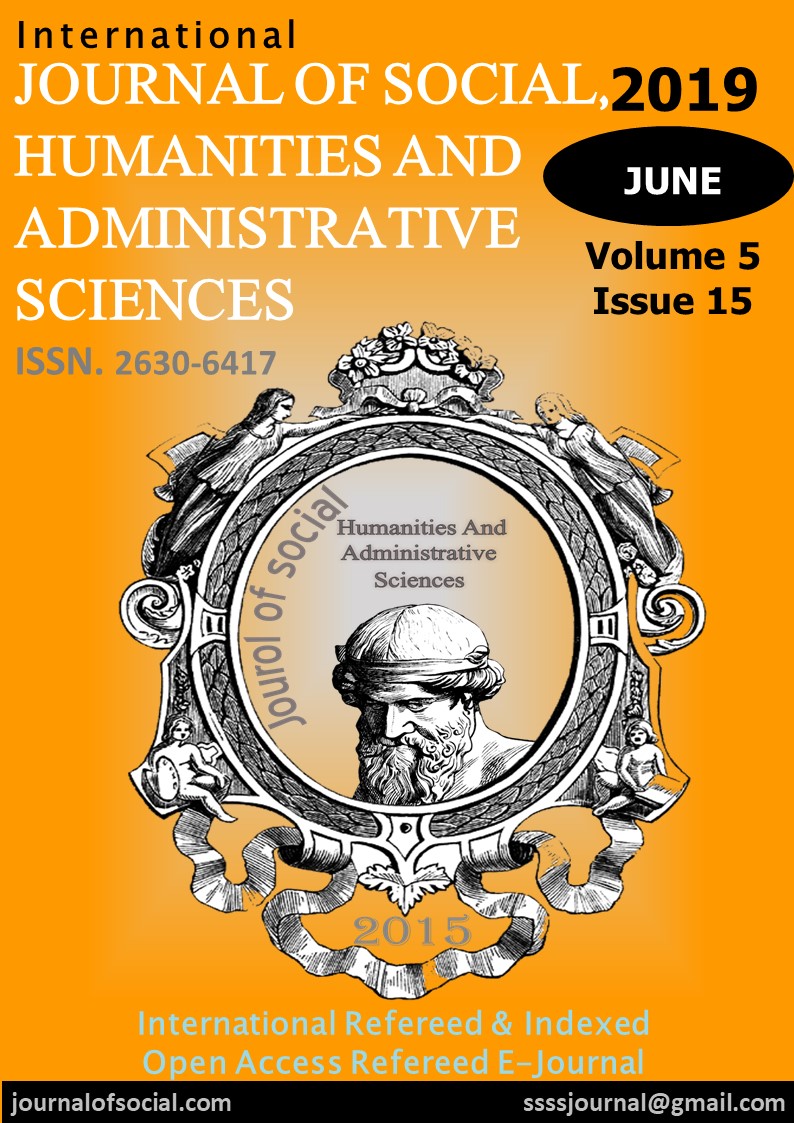THE MEDIATING ROLE OF ORGANIZATION CULTURE ON THE RELATIONSHIP BETWEEN EMOTIONAL INTELLIGENCE AND COMMUNICATION SKILLS : A SAMPLE OF HEALTH EMPLOYEES WHO WORK IN BOZYAKA TRAINING, RESEARCH AND KENT HOSPITALS
Author :
Abstract
Duygusal zekası yüksek olan bireyler, iletişim becerileri konusunda duygusal zekası düşük olanlara göre daha başarılıdırlar. Literatürdeki araştırmalar daha çok bu iki kavram arasındaki ilişkiye yoğunlaşmış, fakat bu ilişkide örgüt kültürünün etkili olabileceği göz ardı edilmiştir. Bu nedenle, bu araştırmada Duygusal zeka, iletişim becerileri ve örgüt kültürü kavramları teorik çerçevede incelenerek aralarındaki ilişki ortaya çıkarılmaya çalışılmıştır. Araştırmanın evrenini İzmir ilindeki bir eğitim araştırma hastanesi ve bir özel hastanede görev yapan 613 sağlık çalışanı (hekim, hemşire, sağlık memuru ve ATT) oluşturmaktadır. Çalışmada kullanılan veri seti dört bölümden oluşmaktadır. Bunlar; Hall tarafından geliştirilen Duygusal Zeka Ölçeği, Korkut’un İletişim Becerileri Ölçeği, Denison’ın Örgüt Kültürü ölçeği ve Demografik özelliklerdir. Elde edilen veriler öncelikle, SPSS 20.0 paket programına girilmiştir. Sonrasında Açıklayıcı Faktör Analizi yapılarak, Güvenilirlik analizi için Cronbach Alfa Katsayısına bakılmıştır. Ayrıca Doğrulayıcı Faktör Analizi yapılarak, araştırmada kurulan kavramsal model “yapısal eşitlik modeli” (YEM) ile test edilmiştir. Sonuçta, araştırma duygusal zeka, iletişim becerileri ve örgüt kültürü arasında pozitif ve anlamlı ilişkileri desteklemiş ve örgüt kültürünün aracı rolü tespit edilmiştir.
Keywords
Abstract
The people who have high-level emotional intelligence are more successfull communication skills than others who have low level emotional intelligence. Research in the literature is more focused on the relationship between these two concepts, but effectiveness of organizational culture has been overlooked in among this relationship. Therefore, the Emotional Intelligence, Communication Skills and Organizational Culture were examined theoretical framework and the relationship between them were revealed in this research. The population of the research involves 613 health employees working at a Training, Research Hospital and a Private Hospital in İzmir (doctor, nurse, health staff and ATT). The data set used for the research consists of four parts. These are; Emotional Intelligence scale designed by Hall, Korkut’s Communication Skills Scale, Denison’s Organization Culture scale and Demographics Features. Firstly, The obtained data have been entered into the SPSS 20.0 (Statistical Program for Social Sciences) package program. After that, Exploratory Factor Analysis was made and the Cronbach's alpha coefficients were analyzed for reliability analysis. Also, confirmatory factor analysis was made, conceptual model which was established in the research were tested with "structural equation model” (SEM). Finally, Results suggest a positive and significant association between Emotional Intelligence, Communication Skills and Organizational Culture. Also, Mediating Role of Organizational Culture was determined.
Keywords
- Behera, A. ve Pani, P., (2014), Review of Emotional Intelligence Connecting EI and Communication,
- Behera, A. ve Pani, P., (2014), Review of Emotional Intelligence Connecting EI and Communication, Asian Journal of Research in Business Economics and Management, s.99-112.
- Conrad, C., & Poole, M. S. (2005). Strategic Organizational Communication in a Global Economy. Belmont: CA:Thompson/Wadsworth.
- Danaeefard, H., Salehi, A., Hasiri, A., & Noruzi, M. R. (2012). How Emotional Intelligence AndOrganizational Culture Contribute To Shaping Learning Organization In Public Service Organizations. African Journal of Business Management, 6 (5), 1921-1931.
- Denison, D.R., and Mishra, A.K., (1995). Toward a Theory Of Organizational Culture And Effectiveness. Organization Science, 6(2), 204-223.
- Goleman, D., (1995). Emotional Intelligence: Why It Can Matter More Than Iq For Character, Health and Lifelong Achievement. New York, NY : Bantman Press.
- Goleman, R Boyatzis and A McKee, (2002). The New Leaders: Transforming the Art of Leadership into the Science of Results, Little Brown, London.
- Hersey, P., Blanchard, K., & Johnson, D., (2001). Management of Organizational Behavior : Leading Human Resources (8th ed.). Upper Saddle River, NJ: Prentice Hall.
- Jayasree R., Effective Communication, Access Date: 18.01.2019, http://www.img.kerala.gov.in/docs/downloads/communication.pdf
- Jorfi, H., (2012). Management: A Study of Organizational Culture and the Relationship betweenEmotional Intelligence and Communication Effectiveness, Journal of Management Research, Vol.:4, No:1
- Korkut, F. (1996). Developing Communication Skills Assessment Scale: Reliability and validity studies. Journal of Psychological Counseling and Guidance, 2 (7), 18-23.
- Korkut, F., (2004), School Based Preventive Guidance and Psychological Counseling. Ankara: Anı Publishing.
- Mayer, J. D., Salovey, P., (1997), “What is Emotional Intelligence? Emotional Development andEmotional İntelligence: Implications for Educators”, ed. P. Salovey, D. Sluyter, New York: Basic Books, pp.3-34, p.23.
- Odom, Y.R., Boxx, R.W., Dunn, G.M., (1990). Organizational Cultures, Commitment, Satisfaction and Cohesion. Public Productivity & Management Review, 14 (2): 157-169.
- Salovey, P., & Grewal, D. (2005). The science of emotional intelligence. Current Directions in Psychological Science, 14, 281-285. doi: 10.1111/j.0963-7214 .2005.00381.
- Schutte, S. Nicola; Malouff, M. John; Hall, E. Lena; Haggerty, J. Donald; Cooper, T. Joan; Golden,J.Charles; Dornheim, Liane (1998). “Development and Validation of a Measure of Emotional Intelligence” Personality and Individual Differences, 25, 167-177.
- Su Eroz, S., (2011). The Relationship Between Emotional Intelligence And Communication, Unpublished Ph.D. Thesis, Uludag University, p.72.
- Thamhain, H., (1992). Engineering Management: Managing effectively in technology-based organizations, New York :John Wiley & Sons.
- Tucker, M.L., Meyer, G.D., and Westerman, J.W., (1996). Organizational communication:Development of internal strategic competitive advantage. Journal of Business Communication 33(1), 51-69.





